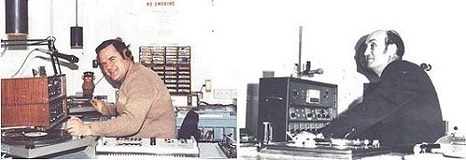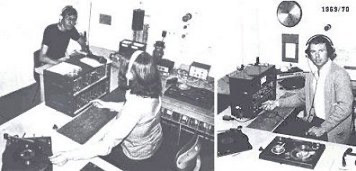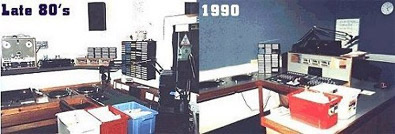Broadcasting to the hospitals of Maidstone started in 1963, when a live wire named Graham Norman decided to start playing records to the captive audience at Maidstone Hospital, he started by compiling and playing reel to reel tapes of patients’ requests, collected from the 'Oakwood' Hospital.

With the astonishingly hip and trendy advent of music radio in the early 1960’s it didn’t take long for Graham to amass a band of eager followers, which led to the formation of the MAIDSTONE HOSPITAL BROADCASTING SERVICE, or M.H.B.S for short.
In September of 1963, as a result of protracted badgering of the hospital’s management, the assembled throng were given a gatehouse at the Oakwood Hospital, a building that contained an old disused stable, which was duly converted into a broadcasting studio, becoming the home of HRM for more than two decades.
After two years of broadcasting regular programmes to the Oakwood Hospital, MHBS spread to the West Kent Hospital followed by the Linton Hospital two years later in ‘The Summer of Love’ - 1967.
Being 1967 the presenters and crew at M.H.B.S decided they wanted a snappier name and duly saved a fortune in printing costs over the coming years by becoming 'Hospital Radio Maidstone' after being awarded charitable status.
Moving with the times live broadcasts started in December 1967 via a land line rented from Post Office Telephones. This radical move clearly didn’t please the gods, and a few months later a storm caused the roof of the Gatehouse studios to come crashing down, flooding the record library, and then in the best traditions of fellow flower power broadcasters Radio Caroline, the GPO landline was struck by lightning, forcing HRM off-air.
Rather than crying into their beer, the fledgling broadcasters decided to throw their collective energies into fund raising; Activities ranging from jumble sales to fudge making earned plenty of money. In no time at all, with a few improvements to the studios, HRM was back on air. Rumours that a shrine was created containing a picture of Tony Blackburn surrounded by joss sticks, flowers and candles to please the gods have since been denied.

In 1973 a second on-air studio was completed and a ribbon made of recording tape was cut by the Mayor of Maidstone, Councillor Kenneth Graham. Even more excitement was to follow in 1977, when HRM received a donation from the Queen’s Silver Jubilee Fund, enabling a third studio to be built.
Things were going swimmingly and the service continued to attract new members, but as in all the best stories a fly eventually landed in the ointment. Not literally, but figuratively speaking. Suddenly the future of HRM at the Oakwood site looked in doubt when the Health Authority revealed dastardly future plans to close the Gatehouse studios! (If this was Eastenders this is where the drums would come in)
An emergency meeting was held in the social club, and after much discussion the decision was made to buy another round. With the help of lager and lime the young Turks decided another fund raising spree was in order, and an elderly CI Sprite caravan was acquired and equipped to use as an outside broadcast unit, but in the style of the Radio 1 Roadshow, several members were then to be seen wandering around local fetes and events wearing dodgy shorts.
With this new facility to help them with their fund raising activities, HRM managed to bring in more than £15,000, enabling the studio equipment to be updated in line with the new Maidstone Hospital that was continuing to expand nearby, and in 1987 BBC Radio Kent's Barbara Sturgeon opened HRM's new state of the art Gatehouse studios.
The new technology available to them enabled the station to split into two different services, Channel One ‘Classic Hits’ (playing pop music, mate!) and Channel Three ‘Dedi-Line’ for patients’ easy listening requests. A computerised system was developed to generate playlists, and C.H.R.R.I.S. (Computerised Hospital Radio Random Index System) made sure the best use was made best use of HRM’s extensive record library. Sadly the computer was the size of a London bus.
Romance had been in the air too, with long serving members Jim Lakeland and Vin Judd finding love through HRM and eventually marrying.. Not to each other you understand, but to Marion and Mary respectively. Elsewhere within the service, relationships between some members didn’t last the distance, with torrid affairs and break-ups - just like Eastenders!

Fortunately this didn’t seem to have any adverse effects on the running of HRM, and with professionalism, broadcasting standards and confidence rising like a stray fund raising balloon, The 1980s ended on a high note when HRM entered the British Telecom Broadcasting Awards and won the catchy title of "Best Regional Service in the South and East", a great achievement by any standards and one to be proud of. It must have been a big trophy to get that lot written on it.
Once the euphoria had died down a little the members discovered that the Health Authority’s earlier plans to close the Gatehouse studio complex had re-surfaced, but the good news was that a generously proportioned suite of rooms in the new service centre at the main hospital was to be their new home, and after another frantic round of fund raising the service upped sticks and moved seamlessly into it’s new home without so much as a jogged record.
With Vin Judd designing and building three spacious ‘on air’ studios, a large record library, lounge area and an office the service was transformed, and while broadcasts to the Linton Hospital and the West Kent Hospital had long since stopped, HRM moved into a new era which would to see them in the coming years embrace digital technology, promote live music and broadcast on FM to Maidstone and the surrounding areas as Maidstone Festival Radio.
As exciting as Maidstone Festival Radio was, it proved to be something of a mixed blessing for HRM. Unsurprisingly new faces appeared out of the woodwork, previous presenters who had long since left the service suddenly reappeared, while other long serving members were passed by for ‘on air’ slots, which caused more than a little resentment.
Once the annual month long broadcasts had ended, the studios became like the Marie Celeste, with only the more dedicated members of HRM continuing with their programmes. Others had tasted life in the fast lane, and after issues with the NHS Trust, MFR eventually decamped to studios in the town centre, taking with it several key HRM members. The then Chairman Jon Maxfield decided to dedicate himself to getting Maidstone a full time FM radio station and eventually succeeded in launching CTR 105.6, later becoming KM-FM.
With the remaining membership at an all time low in both morale and numbers, HRM was in disarray. Changes of committee and Chairman followed, but in the fullness of time fresh enthusiasm from new Chairman Steve Catchpole enabled the station to bounce back and over the next few years HRM went on to win numerous accolades at the annual Hospital Broadcasting Association (HBA) Awards.
While Maidstone Festival Radio was no more, HRM’s links with the Maidstone River Festival grew stronger. The HRM Soundstage, featuring dozens of top local bands developed an enviable reputation among local music event organisers for sound quality, presentation and always running on time.
With our headlining act The Counterfeit Beatles at the 30th anniversary River Festival in 2009, the record crowds were so vast there were concerns among the organisers and police about adequate crowd control. As it happened everybody was well behaved, and the event was a great success.
Meanwhile, back at the turn of the century, HRM’s two channels were re-branded, with ‘Classic Hits’ becoming ‘Energy’ and ‘Dedi-Line evolving into ‘Choice’ complete with a brand new professionally produced jingle package.
With the dawn of the new millennium the awards kept coming, and HRM’s chief carpenter and fund raising co-ordinator Vin Judd decided that it was once again time to give the studios a make-over, and set about crafting beautiful wooden cabinets to house new professional CD players. Just as the second upgraded studio was nearing completion the Maidstone and Tunbridge Wells NHS Trust announced that they needed the space occupied by the HRM studios for offices, and offered an area less than half the size for the service to relocate to. (Cue the drums again…)
As with the move from the gatehouse ten years previously, Vin’s meticulous process of salvaging as much of the woodwork as possible (even down to the soundproofing fabric on the walls, wiring, washers and screws) began and HRM eventually moved to it’s newly designed and built compact studio suite, which included brand new mixing desks (funded by HRM) and custom made furniture, again without any disruption to broadcasts.
Among the new toys the presenters were to get to grips with, was a 24 hour computerised play-out system, allowing pre-recorded voice links in between songs to keep listeners company while the presenters were tucked up in bed. There was also a production studio, utilising the less worn out bits from the previous studios. This included a digital editing suite to enable the creation of jingles, features and programmes.
The new studios were opened by legendary pop singer, TV star and financial guru Adam Faith, a charming, funny and extremely personable man, spending several hours visiting the wards and signing autographs.
As HRM approaches its half century, the service continues to go from strength to strength. The membership has evolved, with many receiving long service awards and a healthy intake of new faces. Regular studio guests are interviewed live on air, including local musicians, representatives from local charities and the Mayor of Maidstone.
There have been occasional changes to the committee, and the fundraising profile is now bigger than ever, the ancient HRM caravan has been replaced with a shiny new studio trailer, which is visiting more and more fetes, dog shows and local events. The state of the art PA system and genial comperes are in demand across much of Kent, with additional income being provided by our very popular mobile disco.
We don’t make much fudge these days, but the shorts are still pretty dodgy.
